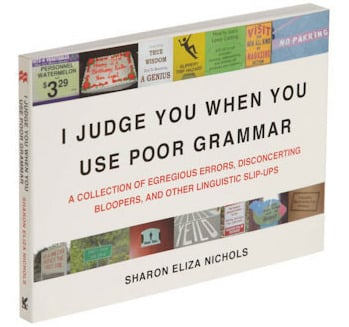I Didnt Get What Was Funny About It but Then I Did
My mother seems to appreciate having a grammar lover in the family. For Christmas one year, she even bought me the bookI Judge You When You Use Poor Grammar. (By the way, it is equally correct to say "bad grammar.")
Recently, my mother emailed to ask if she was using the word "nor" correctly, which brings me to today's article: the use of either, neither, and the connecting words that go with them. What is the correct usage of either and neither and what grammar tricks can we use to remember which one to use? Read on for a quick brush up on some language skills.
Either/Or, Neither/Nor
First things first:
If you are using either and nor together, I hate to break it to you, but you're doing it wrong.
Additionally, nor is generally not used where neither is not also used. Got enough negative terms in there for you? Here's an example of what I mean:
"I fear man nor beast!" Jay proclaimed as Frank stared at the python coiled on the branch over his head. (Wrong.)
"I fear neither man nor beast!" Jay proclaimed as Frank stared at the python coiled on the branch over his head. (Right!)
Correct Use of Either
When either is used with or, it's called a correlative conjunction. ("Correlative" just means having a relationship and a conjunction is a connecting word.)
Either is used when you are making a comparison between two ideas, and only one of the ideas will come to pass. It expresses options. Example:
"Well," said Frank, "either you start fearing, or you are camping by yourself."
Correct Use of Neither
Neither indicates that the two ideas are linked together. It's kind of like a negative conjunction. But if you use neither, then make sure your sentence does not have any other negatives preceding it. If you prefer to use a negative, then you want to use either. Take a look at these two sentences that both make the correct choice:
Jay had seen neither the snake nor the wasp's nest on the next tree, and he was preparing to stake his tarp in that less-than-safe location.
Jay had not seen either the snake or the wasp's nest on the next tree, and he was preparing to stake his tarp in that less-than-safe location.
Both of these sentences are correct, and you can choose according to what you want to emphasize. The first sentence focuses on the two things Jay didn't see, while the second sentence chooses the negative "not seen" to emphasize Jay's lack of awareness.
With these examples, hopefully you will never see a stray nor again.
What do you find tricky about using either/or and neither/nor? Do you have any grammar tricks for remembering which to use? Tell us in the comments.
Need more grammar help?After you master "neither nor" and "either or" in the practice section below, check out my favorite tool, ProWritingAid , which helps writers improve their grammar, sentence structure, and more. Also, be sure to use my coupon code to get 25 percent off:WritePractice25
Still not sure if it's the tool for you? Check out our ProWritingAid Review.
PRACTICE
Tell us about a disastrous camping trip, even if it never happened. Use either/or and neither/nor to establish how much your characters would rather be anywhere but the Arctic tundra or Rocky Mountain wilderness or the Griswold family camping trip.
Post your practice in the box below and leave feedback for other writers.
Enter your practice here:
Liz Bureman
Liz Bureman has a more-than-healthy interest in proper grammatical structure, accurate spelling, and the underappreciated semicolon. When she's not diagramming sentences and reading blogs about how terribly written the Twilight series is, she edits for the Write Practice, causes trouble in Denver, and plays guitar very slowly and poorly. You can follow her on Twitter (@epbure), where she tweets more about music of the mid-90s than writing.
Source: https://thewritepractice.com/how-to-use-either-neither-or-and-nor-correctly/


0 Response to "I Didnt Get What Was Funny About It but Then I Did"
Post a Comment